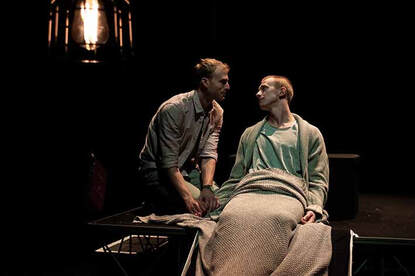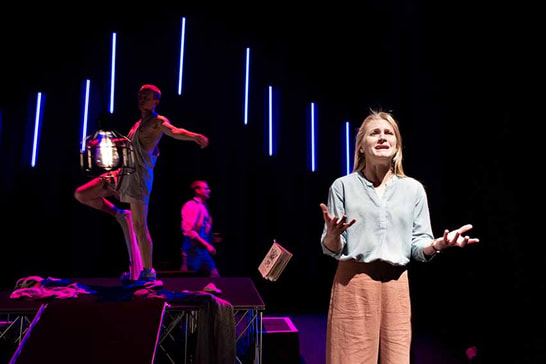By Gill Heal
RECENTLY debuting in La Mama’s Courthouse theatre, When the Light Leaves is a partly autobiographical play about a family’s struggle to deal with a death by cancer and the contentious issue of assisted dying.
Along the way, the writer, Inverloch’s Rory Godbold, charts the pain and confusion that threaten to overwhelm the family, and takes the audience on a journey towards a more clear-eyed understanding of what might be gained and lost when someone is making an end of life choice.
Now this gifted young actor, writer, director, who, in 2006, helped kick start the modern era of the Wonthaggi Theatrical Group in Little Shop of Horrors, is bringing his play home to Wonthaggi.
RECENTLY debuting in La Mama’s Courthouse theatre, When the Light Leaves is a partly autobiographical play about a family’s struggle to deal with a death by cancer and the contentious issue of assisted dying.
Along the way, the writer, Inverloch’s Rory Godbold, charts the pain and confusion that threaten to overwhelm the family, and takes the audience on a journey towards a more clear-eyed understanding of what might be gained and lost when someone is making an end of life choice.
Now this gifted young actor, writer, director, who, in 2006, helped kick start the modern era of the Wonthaggi Theatrical Group in Little Shop of Horrors, is bringing his play home to Wonthaggi.
The writing task can’t have been easy. Australians are not known for dwelling on imponderable topics; we’re better at avoidance. Rory can cite a few barriers of his own making. The unreliable predictions of the time his father, Ray, had left to live were particularly difficult. It could be six months, a year, ten years.
“That really challenged me,” Rory confesses. ”It wasn’t until after Dad had died that I understood how resistant I’d been to the experience. We think it won’t touch us. If it does it will be brief and nice. We will pick ourselves up and move on. That wasn’t my experience. It was long and difficult and traumatic.”
Initially he wrote the play to overcome his grief, “to create order out of the mess”. But the more he wrote the more it became less about his father and more about himself.
“That really challenged me,” Rory confesses. ”It wasn’t until after Dad had died that I understood how resistant I’d been to the experience. We think it won’t touch us. If it does it will be brief and nice. We will pick ourselves up and move on. That wasn’t my experience. It was long and difficult and traumatic.”
Initially he wrote the play to overcome his grief, “to create order out of the mess”. But the more he wrote the more it became less about his father and more about himself.
 Leigh Scully and Tomas Parrish
Leigh Scully and Tomas Parrish “The experience changes you,” explains Rory. ”Our bodies are so connected to our parents. It only dawned after Dad died, the parallel understandings ... him of his own body deteriorating, breaking down, and me of the mortality of my own body. It made me wonder about bits of my own life.”
Faced with a terminal illness, Ray Godbold, palliative care nurse, changed a long-held habit. Like most people working with death and dying, he’d rarely brought his work home. “In a sense, all the deaths he’d been part of, he’d carried with him,” says Rory. Now his diagnosis gave him a reason to sift through all this experience. “It started to have more impact on how he wanted the last phase of his life to play out.”
“It was similar for me,” says Rory. “Our family had experienced five significant deaths within four years. That experience of witnessing those deaths, of hearing Dad talk about good and bad deaths, gave me an avenue to explore. Like Dad, I now had something to share.”
So Rory turned to writing about it as a means of understanding what had happened. He wanted to open up the conversation. “If we can talk about our own death more, not in a morbid way where we’re consumed by it, we might have more of a sense of what we want this last phase of our life to be.”
As in all good theatre, truth matters and the play employs a range of theatrical devices to keep it truthful. “On one hand the play is fiction. The relationships don’t represent me entirely. The key characters switched in the drafting process from being a couple like my dad and mum to one more like I might be in.”
Truth, rather, lies in the real sequence of events. The play steers away from sentimentality. It moves quickly, not allowing the audience to dwell. The flaws in the characters keep the play honest, yet it doesn’t look to judge.
“The play is stronger for portraying, without fanfare, how both sides of the assisted dying debate seek to affirm life and love,” says The Age arts reviewer Cameron Woodhead.
Introducing abstract elements into a conventional narrative triggers another kind of lived experience. In When the Light Leaves, props hanging on the end of threads represent a kind of mindscape. Time can jump all over the place. There’s less of the conventional talking between characters and more talking to the audience.
”There’s chaos and mess and sounds. It communicates viscerally. The thing about theatre is that it puts us in touch with these grand things in ourselves in a very safe way. It can purge emotions.”
To be put in touch with yourself. That’s real theatre.
When the Light Leaves: WTG Shed, State Coal Mine, Garden Street, Wonthaggi, Friday, Sep 20, 8pm, Sat, Sep 21, 2pm and 8pm. Original play written by Rory Godbold, directed by Jayde Kirchert. . Book online.
Faced with a terminal illness, Ray Godbold, palliative care nurse, changed a long-held habit. Like most people working with death and dying, he’d rarely brought his work home. “In a sense, all the deaths he’d been part of, he’d carried with him,” says Rory. Now his diagnosis gave him a reason to sift through all this experience. “It started to have more impact on how he wanted the last phase of his life to play out.”
“It was similar for me,” says Rory. “Our family had experienced five significant deaths within four years. That experience of witnessing those deaths, of hearing Dad talk about good and bad deaths, gave me an avenue to explore. Like Dad, I now had something to share.”
So Rory turned to writing about it as a means of understanding what had happened. He wanted to open up the conversation. “If we can talk about our own death more, not in a morbid way where we’re consumed by it, we might have more of a sense of what we want this last phase of our life to be.”
As in all good theatre, truth matters and the play employs a range of theatrical devices to keep it truthful. “On one hand the play is fiction. The relationships don’t represent me entirely. The key characters switched in the drafting process from being a couple like my dad and mum to one more like I might be in.”
Truth, rather, lies in the real sequence of events. The play steers away from sentimentality. It moves quickly, not allowing the audience to dwell. The flaws in the characters keep the play honest, yet it doesn’t look to judge.
“The play is stronger for portraying, without fanfare, how both sides of the assisted dying debate seek to affirm life and love,” says The Age arts reviewer Cameron Woodhead.
Introducing abstract elements into a conventional narrative triggers another kind of lived experience. In When the Light Leaves, props hanging on the end of threads represent a kind of mindscape. Time can jump all over the place. There’s less of the conventional talking between characters and more talking to the audience.
”There’s chaos and mess and sounds. It communicates viscerally. The thing about theatre is that it puts us in touch with these grand things in ourselves in a very safe way. It can purge emotions.”
To be put in touch with yourself. That’s real theatre.
When the Light Leaves: WTG Shed, State Coal Mine, Garden Street, Wonthaggi, Friday, Sep 20, 8pm, Sat, Sep 21, 2pm and 8pm. Original play written by Rory Godbold, directed by Jayde Kirchert. . Book online.
